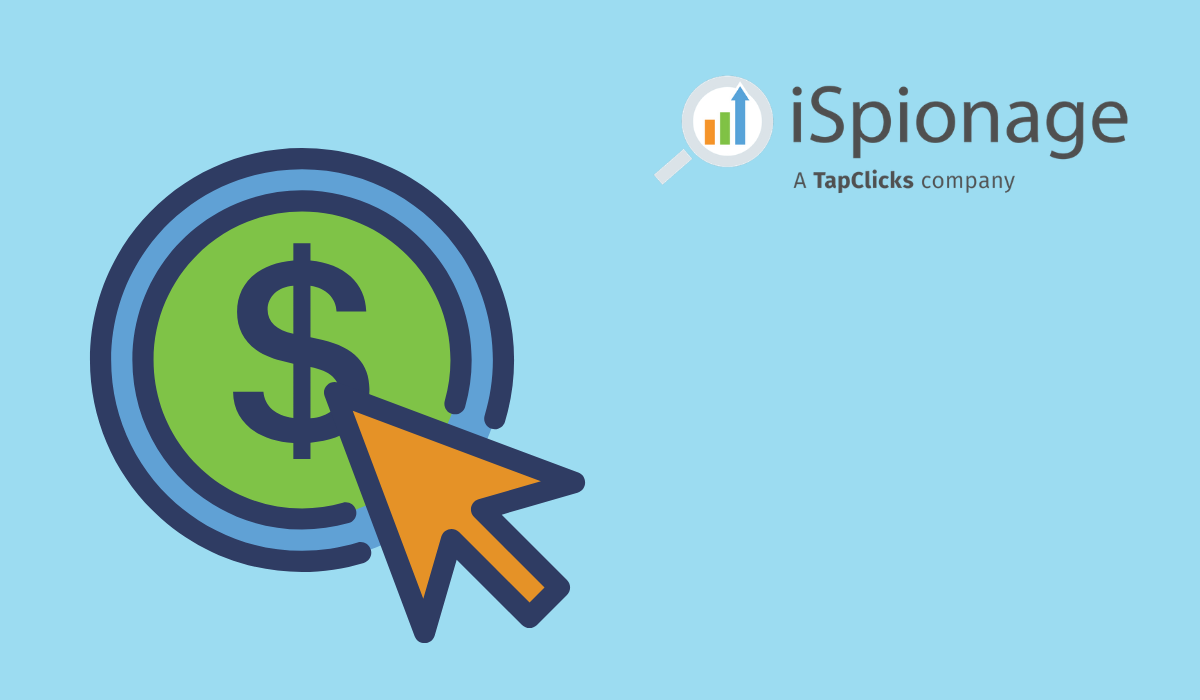
The global economy has taken a huge hit with the onset of the COVID-19 crisis, and this has affected businesses in every walk of life. Many of our customers — PPC & SEO agencies and businesses — have been impacted by nosediving ad budgets and overnight drops in demand for their products and services.

How should advertising companies respond to this type of crisis? Should they cut the budget immediately and wait until things get back to normal? To learn more about this, we spoke to Alex Minchin, the Founder and Managing Director of an award-winning digital agency in the UK, Zest Digital.
Alex also has plenty of advice for how agencies can weather the storm — which is featured here — but in this interview, we’ll hear about how his agency is helping its clients run effective PPC campaigns in a world that has been turned upside down.
How PPC Advertisers Maintain Results and Return on Ad Spend
Let’s be clear: In a crisis and economic downturn, many businesses simply don’t have the option of continuing their PPC ad spend — because their industry has taken such a direct hit. So, first and foremost, we understand that the advice in this article doesn’t help everyone.
That said, if your business remains operational and you’re more indirectly affected, here are seven approaches that Alex’s team has implemented and also recommend to clients:
1. Take a Breath; Don’t Panic
“Understandably, we saw a lot of panic at the start,” says Alex. “Some clients halted their bidding immediately, but for those who didn’t, we saw some amazing results. They might not have gotten quite as many conversions, but what they did get was at a fraction of the cost compared to a few weeks ago.”
For industries that are still ticking along, Alex has seen much lower CPCs (50% cheaper in some circumstances), and search visibility that has gone through the roof.
“Conversions have generally been down, but lots of our clients are actually seeing a much lower cost-per-conversion — partly because of the reduced cost-per-clicks. If you have enough cash reserves, this might be an opportunity to benefit from the lowest click costs in years,” Alex says.
Many of Zest’s clients have seen soaring impression shares without the PPC team making any major changes to their campaigns. This is the result of the reduced competition, meaning they get significantly more eyeballs on their ads in the SERPs than they would have a few weeks ago.
“The key takeaway here is to take a breath, look at what’s happening in your niche, and adapt. Don’t make knee-jerk decisions unless it’s clear you’re under immediate threat,” Alex says.
2. Keep the Campaigns Targeting Brand Terms
According to Alex, PPC advertisers must continue to bid on brand keyword terms — even if they’re making budget cuts elsewhere on their Google Ads campaigns.
“You can rely on the brand terms,” says Alex. “The people searching for brand keyword variations are often prequalified, and at the very least, they’re in the consideration phase — even when searching your brand versus a competitor. If you need to cut the budget somewhere, don’t cut it for the brand terms.”
At the same time, brand terms tend to be cheaper than other PPC keywords. According to Alex, the fact that they’re cost-effective and high-intent means they should be the last campaigns to be chopped.
3. Rethink Your Customer Avatars
A customer avatar is similar to a persona but more focused on the individual detail of an advertiser’s ideal customer. According to Alex, businesses need to reassess their avatars in the light of a major event.
“A crisis changes people,” Alex says. “Advertisers need to think about how something like COVID-19 affects their customers. A person’s beliefs, goals, priorities, and challenges will all be impacted by a global crisis and its economic impact — so you need to think about how you fit into that landscape.”
This is relevant on two levels. Firstly, in how an advertiser’s offer relates to their audience’s pain points. For example, the target audience of an HR software might have new front-of-mind challenges around managing a remote team for the first time. And the second level relates to how the audience feels and what they need to know before making a purchase.
“People are fearful about their health and employment. Consider how this affects their purchasing decisions. Will they need more guarantees and refund options? Can you change your contractual terms? In uncertain times, advertisers must adapt their ads and landing pages to reassure prospects,” Alex says.
According to Alex, the fundamental characteristics of your audience will shift during times of crisis, and may not even return to “normal” post-crisis. This means advertisers need to revisit their customer avatars, rather than advertising to the same old audience with the same old message.
(Keep in mind: the images in this post are clickable so that you can get a better look at everything.)
4. Adapt Your Landing Page Conversion Strategy
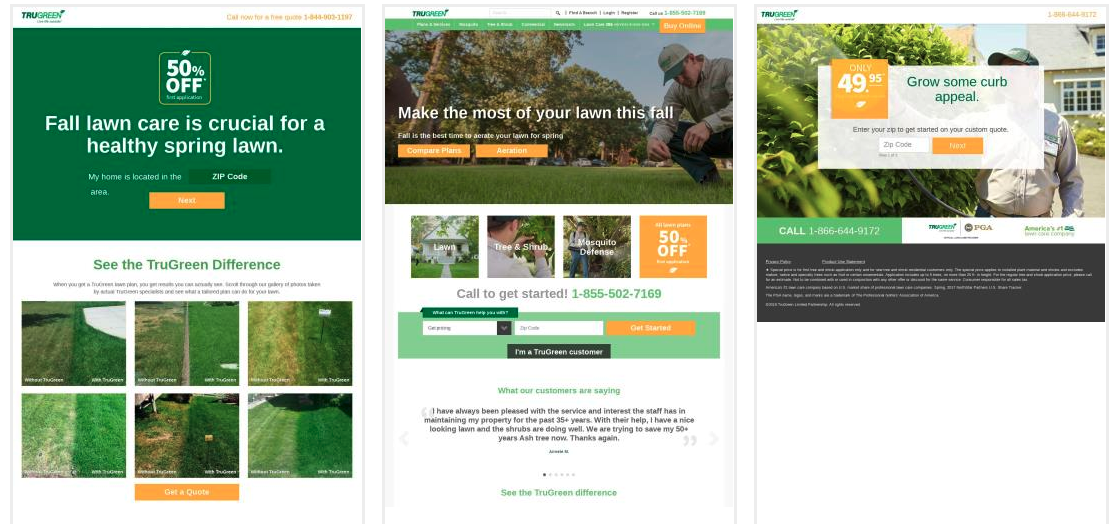
This is a screenshot from iSpionage Campaign Watch, where you can track competitor landing pages and see whether they’re making changes to their designs, offers, or messaging.
“Previously, we were quite aggressive with direct-to-enquiry CTAs on landing pages,” Alex says. “But we’ve had to take a step back and focus on softer conversions for some of our PPC clients.”
In challenging and uncertain times, your audience might, understandably, be hesitant to commit. This means you could see better conversions by reducing the commitment barrier. If you’re less likely to get a sale, you can still get value from PPC by softening the CTA or offering an alternative user journey.
Alex uses the example of a landscaping and garden design company:
“Asking to speak to a designer is a big commitment, because people expect the hard sell. We can be creative here and say ‘If now isn’t the right time to redesign your garden, download our free garden planning template. Simply complete it yourself, or book one of our garden planning workshops.’ This builds trust in your brand and keeps your audience engaged, even when homeowners are hesitant to make big investments in their property.”
While adding more steps to the customer journey seems counterintuitive in normal circumstances, stretching the interest and desire stage (of the AIDA model) during times of crisis — and providing more value over a longer period of time — will give you the edge when prospects are ready to buy later.
Note: iSpionage allows you to track your competitors’ full user journey — from keyword to ad to landing page. If you want to see, for free, how your competitors are adapting their conversion strategy, simply run their URL through iSpionage Competitor Research. You can monitor landing pages and ads over time (and get auto alerts) by using our SEM Campaign Watch feature — available on our paid plans.
5. Find New Keywords or Shift PPC Budget to Alternative Keywords
We recently spoke to an iSpionage user who runs a private counseling service, and they’d seen conversions drop from 20 per week to just single figures. Due to social distancing and clientele job volatility, there wasn’t much they could do about this — except to promote their online therapy services.
What had once been an ancillary service quickly became their most important offering — and their PPC strategy had to be adjusted to account for the abrupt change in their customers’ behavior.
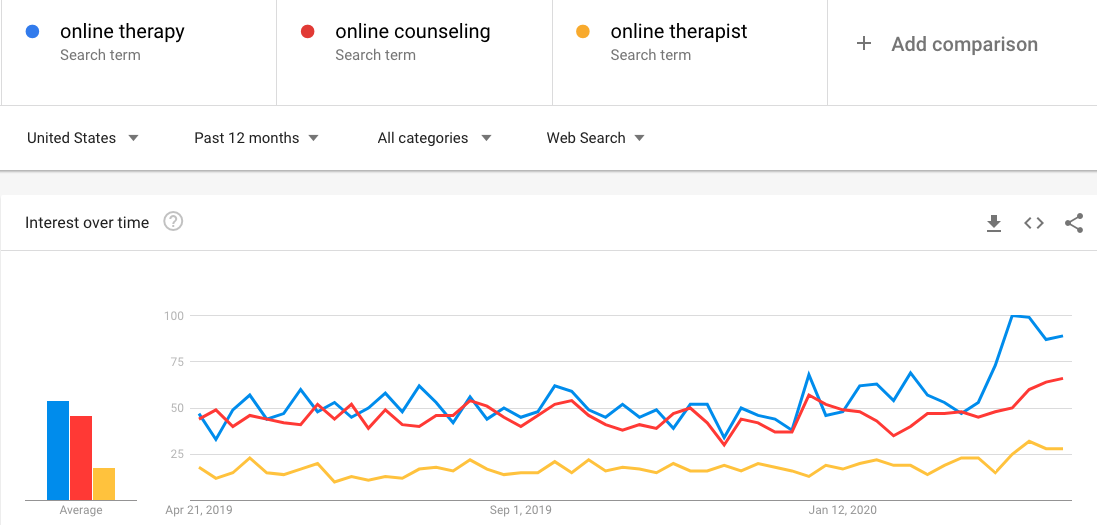
Source: Google Trends
“Keyword strategy is intrinsically linked to business strategy,” Alex says. “If you need to pivot your service offering, PPC offers the opportunity to validate ideas quickly and drive new customers. Often these keywords will write themselves, but before shifting budget across, you need to research the landscape in full detail.”
Note: With the Competitor Research tool in iSpionage, you can search the PPC landscape (on a national level) to see who competes for your new target keywords — and you can browse through Related Keywords to get keyword ideas and know their search volume and CPC estimate.
Our Ad Effectiveness Index (AEI) & Keyword Effectiveness Index (KEI) metrics provide indicators for which ads and keywords are most profitable for advertisers, which is something you can use to guide your keyword targeting strategy from the outset.
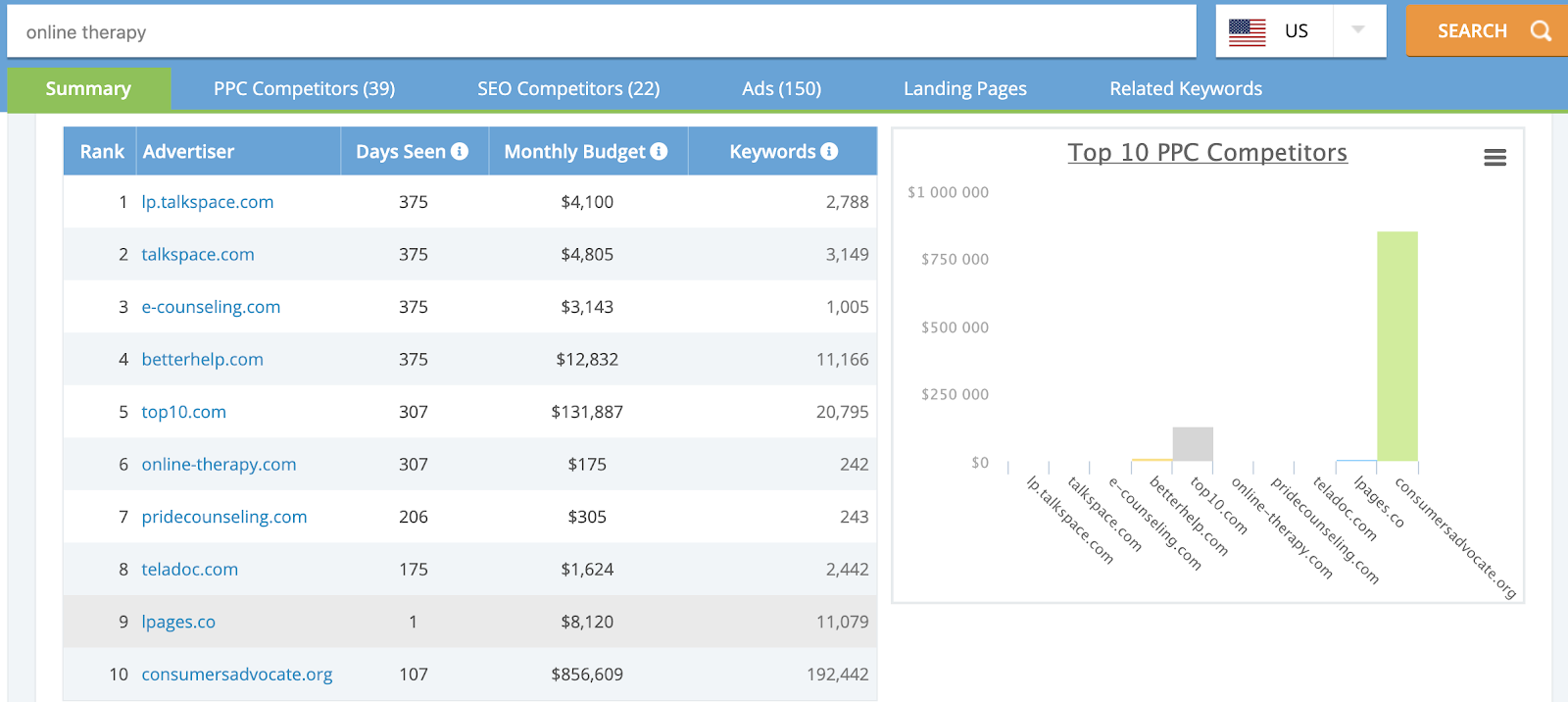
And with our SEM Campaign Watch feature, you can track a keyword in your location (e.g. “online therapy” in New York) and dig into which keywords are effective right now for competitors, plus you can see how competitors target visitors with ad copy and landing pages — including their A/B tests.
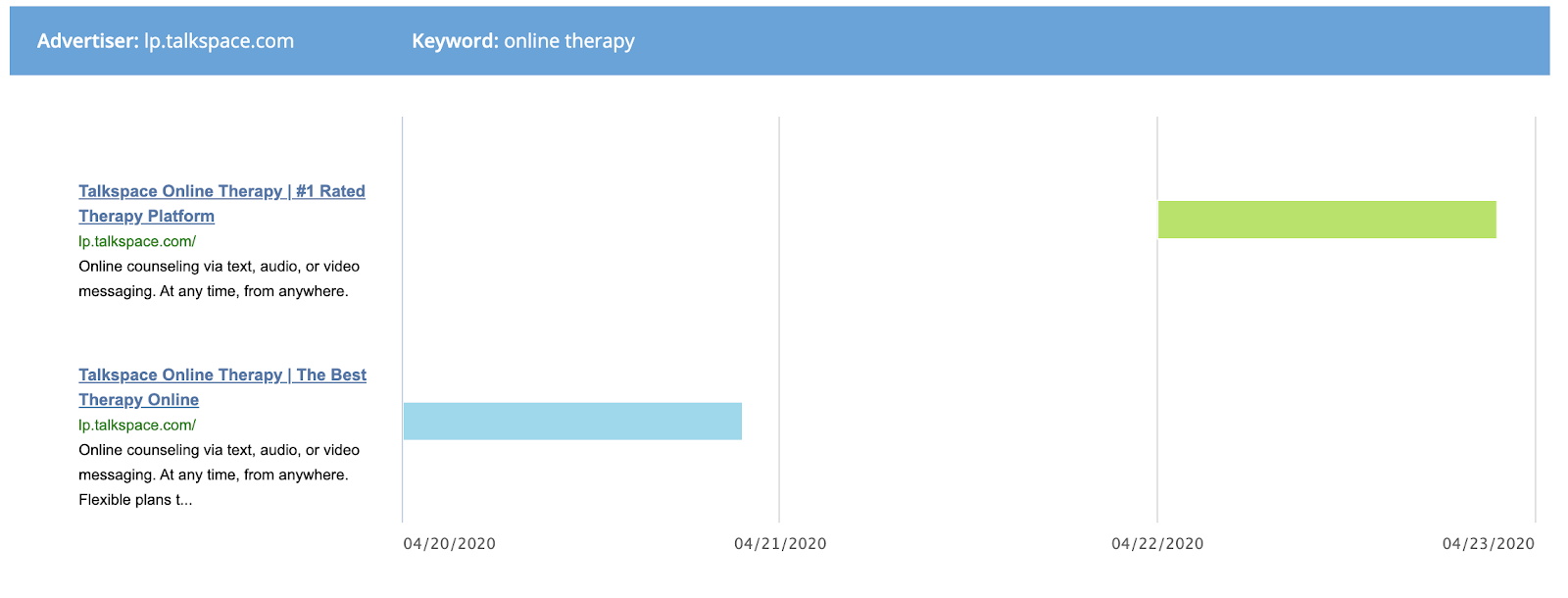
6. Use the Pay-Per-Conversion Model on Google Display Network
For Display advertisers, Alex recommends shifting to Google’s pay-per-conversion model. Officially, you need a track record in your ads account to use this model: More than 100 conversions in the previous 30 days. But recently, Alex has seen it work for clients with just 60 conversions in the previous 30 days.
“Can you use a Target CPA rather than paying for click costs? It’s worth exploring, because this has been a really effective move for some of our clients — who have increased their certainty about ROAS while getting unlimited eyeballs (brand awareness) on their Display ads,” Alex says.
Important note: It’s essential to set up conversion tracking accurately for pay-per-conversion, because you don’t want to end up paying hundreds of dollars for a pageview.
7. Adapt PPC Ads and Landing Pages to Provide Clarity
“Since being put into lockdown due to COVID-19, I’ve taken up gardening for beginners,” Alex says. “So, I’ve been trying to buy seeds, soil, compost, and other items I’ve never bought before. I must have been through three or four websites before I found one that I was 100% confident could deliver the goods in current circumstances. None of the others gave information about their status, so I didn’t trust them.”
Alex’s own experience made him realize that his agency’s clients need to reassure prospects in their messaging — on the ads and landing pages that are used in their paid and organic campaigns. By offering certainty and clarity in a confusing time, these businesses can reduce bounces and increase conversions.
“If you pretend everything’s normal in your comms, you might actually be creating doubt in your audience. Even if the news is ‘bad’ (for example, longer delivery times), people are more tolerant than before and will appreciate honesty. Above all, your customers want to know what to expect,” Alex says.
Final Thoughts: Advertisers Can Continue to Thrive
Above all, Alex recommends that if possible, PPC advertisers shouldn’t rush into making quick decisions. It pays to be wise, to stand back and assess the situation before taking action:
“If you stop advertising overnight, you might actually be handing the advantage to competitors who are adapting to the situation, targeting new keywords, distributing budget differently, and serving customers in new ways. It won’t be possible for all businesses to adapt, because it depends on how each industry is affected. But there are opportunities for many advertisers to tweak PPC strategy and continue to thrive.”
Alex Minchin is the founder and Managing Director of Zest Digital, an award-winning digital agency based in Oxford, UK. We also interviewed him to learn about how PPC agencies can weather the storm of a crisis and economic downturn.
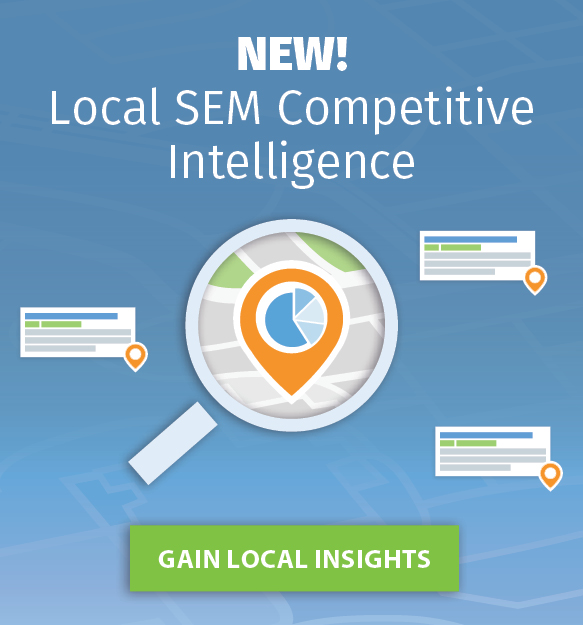










Comments are closed.